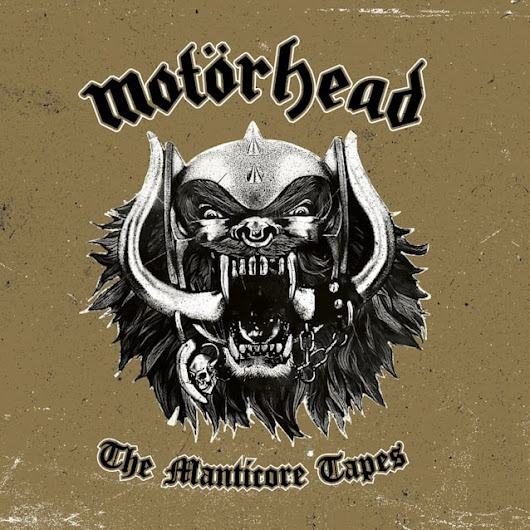In 1976, Motörhead
solidified its definitive “Three Amigos” lineup with Lemmy Kilmister on
bass and vocals, Fast Eddie Clarke on guitar, and Phil “Philthy
Animal” Taylor on drums. Formed the previous year after Lemmy’s
high-profile dismissal from Hawkwind, the band clawed its way through
setbacks, label rejections, and shifting personnel before finding the chemistry
that would define its sound for decades to come. With roots in hard rock, punk,
and early metal, Motörhead forged a sound that blurred genre lines with
raw immediacy and intensity. In August 1976, the trio entered Emerson, Lake
& Palmer’s Manticore Studio in Fulham, capturing a foundational
session that until now remained unheard.
“The
Manticore Tapes” documents that early moment with clarity and historical
weight. The material, rescued from the archives after nearly half a century,
delivers primitive versions of songs that would later become synonymous with
the band's reputation. The presence of multiple covers—“Leavin’ Here,” “The
Watcher,” “Witch Doctor,” and others—reflects the band's formative influences,
filtered through a loud, grimy, high-energy sound that’s distinctly theirs.
“Motörhead,” carried over from Hawkwind, and early takes of “Iron Horse/Born
To Lose” demonstrate how even at this embryonic stage, the band's intent was
firmly locked in: fast, loud, and aggressive.
The alternate takes and instrumentals on Disc I offer a glimpse into the studio environment: unrefined, repetitive, but urgent. There’s no pretense or technical finesse here—just an attempt to document their live set in a controlled setting, with songs that feel like they could collapse at any moment but never quite do. The grit is tangible, and the lack of polish only reinforces its authenticity.
Disc 2, “Blitzkrieg
On Birmingham ’77,” captured live in a cramped, chaotic venue, reinforces what
these early years were truly about. The crowd noise, the cranked amps, the
ragged edges of the band’s playing—it all breathes with a kind of chaotic
unity. The live takes of “On Parole,” “City Kids,” and “White Line Fever” make
clear that Motörhead was already becoming something more than a pub
band, even if they didn’t fully realize it yet. Lemmy’s distinct vocal
tone is defiant, Eddie Clarke’s playing sounds half-feral, and Phil
Taylor drives everything with reckless, uneven energy.
The sound
restoration is carefully handled, preserving flaws without obscuring fidelity.
There’s hiss, bleed, and occasional distortion, but these imperfections add
texture rather than detract from it. This is not a retrospective compilation
built for comfort listening; it's an unearthed moment from a band unsure of its
place but certain of its direction.
“The
Manticore Tapes” represents the moment when the band first left a permanent
mark on tape and carries its own weight. It captures Motörhead before
myth overtook them—scrappy, raw, and barely hanging on. Almost fifty years
later, these tapes finally step into the light, not as an attempt to rewrite
history, but simply to preserve it.
Score: 8.6




.jpg)



No comments:
Post a Comment